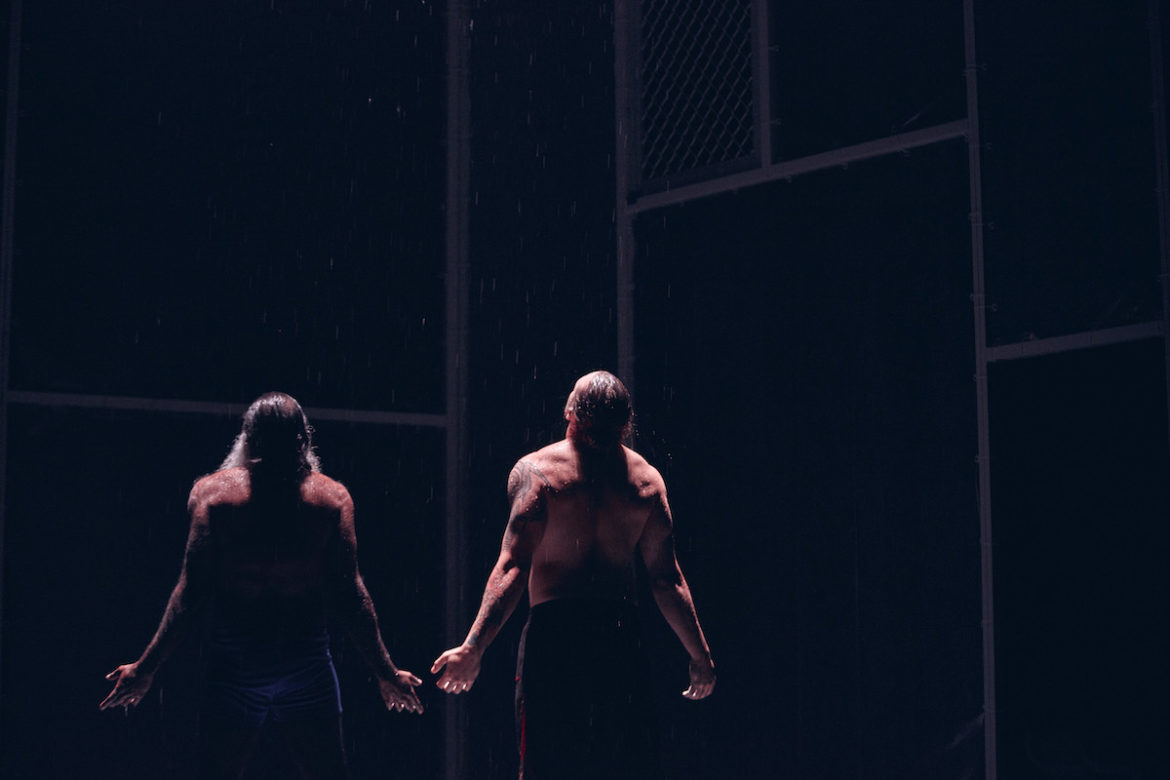“Does the picture in your head ever go away?” Monique Grbec reviews Jada Albert’s Brothers Wreck, a devastating play about Indigenous suicide
Translucent concrete-blue plastic tarpaulins are stretched across the stage walls, floor and ceiling. Several 70’s honeycomb-metal screen doors are randomly inserted into the tarps suggesting a multitude of same-same residences. The stationary silence of the doors echoes loudly for me, invoking the thousands of times I heard one slam shut in my suburban childhood. Is this the prison of Darwin suburbia?
In pre-dawn darkness, a soundtrack of easy-listening male vocals lullabies the foetal curl of a sleeping Ruben (Dion Williams). Adele (Leonie Whyman), just awake, casually walks across stage through a screen door. We don’t hear the metallic vibration as it slams shut because we are bombarded with a machinegun burst of screaming desperation that locks me to my seat. Noooooooo…
Barely two minutes into Jada Albert’s Brothers Wreck, there’s a suicide. The off-scene frenzy to get the body down is vivid and torturous. Brutality is bleeding everywhere. We are left to imagine the heaviness of the body, the arms and legs flailing: Get him down! Please get him down and make this violent death go away. Hurry! But even with the help of her partner Jarrod (Nelson Baker), a chair, a ladder, and several knives, the dead man is too tangled. Eventually Jarrod persuades the distraught Adele to give up.
Throughout the hysteria, Ruben is mute and immobile.
In the short-lived calm after the violence, we have time to consider why this man killed himself. Without meeting him, how will we ever know? But then, we can never know why people kill themselves. At a time when Indigenous rates of suicide are four times the rate of non-indigenous people, this show asks the question: will the trauma of our colonisation and the white supremacist propaganda with its theft, massacres and slavery ever be reconcilable?
Instead of the five steps of grief that purport to walk us back into life, the central character Ruben stagnates in the self-destruction of toxic masculinity. The brash bravado of youth is powerfully portrayed by Williams: he will not be helped or hurried by family, friends or by David (Trevor Jamieson), the court appointed counsellor who has lived experience of the aftermath of suicide. David, with his thick and chest-long grey beard, has the look and gentle presence of a respected elder.
I find my anger festering when Ruben disrespects him with misogynistic insults and obstinate dismissiveness. Focusing on his poverty and lack of opportunity, Ruben deflects David’s wise practicality, interpreting kindness as weakness. In his dialogues with David, we understand that Ruben’s self-appointed responsibility to take care of family has left him blind to the richness they bring to his life.
Kelly Ryall’s sound and Dale Ferguson’s visual design cohere within an extended metaphor of water: the sight of flooding doorways (yes, it rained in the theatre!) and the booming reverberation of torrential rain during Darwin’s wet season amplify Ruben’s sinking in a quagmire of alcohol induced misdemeanours. We learn that he loved fishing and the Front Yard Challenge, a four man tinny he salvaged and fixed up with his mates; that his biological mum died and his dad deserted him; and that he was the one who bought the net that was used in the hanging. Argh! More than a few times during the performance I find myself gasping for air as though I’ve been submerged in the water. At other times my tears fall in sadness, frustration or ripping rage.
When Ruben’s adopted mother is hospitalised with a football-sized tumour on her liver, the arrival of the colourful, energetic and straight talking Petra (Lisa Flanagan) brings some much needed relief. I am mesmerised by the way she wraps her arms tightly around Adele, drawing her into warm deep hugs. I feel sunshine in my heart, remembering how much they’re like my mum’s hugs. I imagine resting my head in the nook of her neck, and wonder if Mum hadn’t been taken as a ward of the state at eight months old, maybe she would have had this woman’s charismatic confidence? Been more able to stand strong and proud against the white supremacist narrative that instilled shame for her Aboriginality.
The powerful family connection between characters is gripping and a testament to Aboriginal resilience. Each with their own helplessness and coping in their own ways, they rally around Ruben. While he doesn’t choose to tell them he had heard the sound of scampering mice on that fateful morning he does ask David the question we all need to know: Does the picture in your head ever go away?
Speaking for the horror of historic wrongs, I often question: Will I ever be able to think of bushland Victoria without seeing women from my family chained to trees to be raped at the leisure of passers-by?
I walk out of the theatre head down, too full of emotions to stop for an opening night sandwich. I feel like I’ve been in a car accident. I want a drink and stop at the bottle-shop, but go for a chocolate bar instead. Alcohol is a lesson I need to learn – and the show reaffirmed it. How can I be mindful, when I’m disappearing in that murky swamp?
Brothers Wreck, written and directed by Jada Alberts. Set and costumes by Dale Ferguson, lighting design by Chris Petridis, composition and sound design by Kelly Ryall. Performed by Nelson Baker, Lisa Flanagan, Trevor Jamieson, Leonie Whyman and Dion Williams. Malthouse Theatre until June 23. Bookings
*WARNING* This play contains content that is distressing. It involves an offstage death through suicide. If you need help with depression, anxiety or mental illness, please contact Lifeline (13 11 14) or the Kids Helpline (1800 55 1800).
Malthouse Theatre is wheelchair accessible. An Auslan interpreted performance takes place on Friday, June 22.


1 comment
[…] June 20, 2018 | Editor: Alison Croggon | Witness Performance […]
Comments are closed.